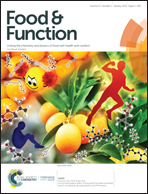Combination of curcuma zedoary and kelp inhibits growth and metastasis of liver cancer in vivo and in vitro via reducing endogenous H2S levels
Abstract
The combination of traditional Chinese medicines can improve the efficacy of cancer treatment. Furthermore, the combination of the traditional Chinese medicine curcuma zedoary and kelp was used to enhance the effect of the dissipation of blood stasis in pediatrics during the Song Dynasty. Curcumenol and laminarin, the main components of curcuma zedoary and kelp, are also reported to have a wide range of biological activities. Therefore, we hypothesize that the combination of curcuma zedoary and kelp may prevent the development of cancer. The aim of this research was to confirm whether a combination of curcuma zedoary and kelp could inhibit the proliferation and metastasis of hepatoma cells and consequently improve prognosis. In this study, we firstly found in H22-bearing mice that the combination of curcuma zedoary and kelp inhibited tumor growth and the expression of metastasis-related proteins (MMPs, VEGF, pAkt, pERK1/2). Meanwhile, the decreased cystathionine beta synthase (CBS, an endogenous hydrogen sulfide (H2S) synthetase) level was also observed in H22-bearing mice admistrated with the combination of curcuma zedoary and kelp. It was also observed that the combination of curcumenol and laminarin inhibited the proliferation, migration and invasion in human hepatoma HepG2 cells. Furthermore, we investigated the potential inhibiting mechanism of the combination of curcumenol and laminarin on HepG2 cell proliferation and metastasis. Our previous research showed that a CBS/H2S system was vital for maintaining the proliferation in hepatoma cells. Here, we found that the levels of pSTAT3 and BCL-2 were decreased in CBS knockdown HepG2 cells and the combination of curcumenol and laminarin significantly decreased the H2S level in a dose-dependent manner and down-regulated the levels of pSTAT3 and BCL-2 in HepG2 cells. Angiogenesis, positively regulated by the vascular endothelial growth factor (VEGF), is essential for human cancer metastasis. In the present study, we found that the combination of curcumenol and laminarin could significantly down-regulate the expression levels of VEGF and its downstream key genes pAkt and pERK1/2. Furthermore, previous research showed that hydrogen sulfide could stimulate angiogenesis. Here, we also observed the reduction of the VEGF, Akt, pAkt, ERK1/2 and pERK1/2 proteins levels and the inhibition of proliferation and metastasis in CBS knockdown HepG2 cells. Moreover, exogenous H2S rescued the cytological results caused by the combination of curcumenol and laminarin. Taken together, the combination of curcuma zedoary and kelp could inhibit the proliferation and metastasis of liver cancer cells in vivo and in vitro by inhibiting endogenous H2S production and down-regulating the pSTAT3/BCL-2 and VEGF pathway, which provides strong evidence for the application of curcuma zedoary and kelp in treatments of liver cancer.



 Please wait while we load your content...
Please wait while we load your content...